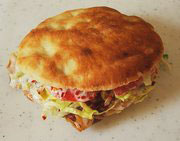Desperate Housewives 1《绝望主妇》1(精讲之二)
音频下载[点击右键另存为]
影片对白
 Mary Alice Young: Susan awoke that night alone and parched. And as she gazed out her window, she saw the tall drink of water she needed to quench her thirst.
Mary Alice Young: Susan awoke that night alone and parched. And as she gazed out her window, she saw the tall drink of water she needed to quench her thirst.
Julie: Dear Diary. Mike doesn't even know I'm alive.
Susan: Shut up.
Julie: If you want to date him, you're gonna have to ask him out.
Susan: I keep hoping he'll ask me out.
Julie: How's that going?
Susan: Shouldn't you be making brownies for your nerdy friends?
Julie: I can't find the measuring cup. Have you seen it?
Susan: The measuring cup?
Julie: Yeah.
Susan: Hmm. I, uh, well, it's gotta be here somewhere. Just keep looking.
Carlos: I know you're awake.
Gabrielle: I know you're a jerk.
Carlos: Dinner with Tanaka ran long. I'm sorry.
Gabrielle: You know, Carlos, I didn't marry you so I have dinner by myself 6 times a week. You know how bored I was today. I came this close to actually cleaning the house.
Carlos: Don't be that way. I got you a gift.
Gabrielle: Nope. No, no, no, no. You're not gonna buy your way out of this one.
Carlos: It's a good gift.
Gabrielle: Is that white gold?
Carlos: Yeah. Put it on. And then make love to me.
Gabrielle: Not in the mood. But, we could stay up and talk.
Carlos: When a man buys a woman expensive jewelry, there are many things he may want in return. For future reference, conversation ain't one of them. Hey, that was a joke.
Gabrielle: Yeah, right.
Carlos: What the hell is wrong with you?
Gabrielle: Let go of me.
Carlos: You've been acting like a nightmare for a month.
Gabrielle: Stop!
Carlos: What's wrong? I can't fix it unless you tell me.
Gabrielle: It's not exciting anymore, Carlos.
Carlos: So what am I supposed to do?
Gabrielle: I dunno. Be the way you used to be. Surprise me. Take my breath away.
Carlos: Okay. Okay!
Mike: Hey, Susan.
Susan: Mike!
Mike: What's wrong?
Susan: I didn't realize anybody was going to be out here. I just sort of rolled out of bed.
Mike: I'm sure you look fine.
Mike: Bongo, Bongo, Bongo. No, no... Behave. Sorry. He scares easy.
Susan: No, it, it, it's fine. I get it.
Mike: I didn't mean to disturb you. I'll see you later.
Susan: Did you want to have dinner with me?
Mike: Just the two of us?
Susan: Well, and Julie. Uh, it's a thing we do when somebody new moves into the neighborhood, we invite them over for a home-cooked meal. It's sort of a tradition.
Mike: I thought you said you were a lousy cook.
Susan: Well, I order take-out.
Mike: Oh. You invite them over for home-cooking and you give 'em takeout.
Susan: Yeah, it's, it's, uh, it's sort of a new tradition. I'm working out the kinks.
Mike: I'll tell you what. How 'bout I cook. And you guys come over to my place?
Susan: Oh! Great.
Mike: Friday night at six?
Susan: I'll be there.
Mike: Alright.
Susan: Bye, Bongo.
妙语佳句,活学活用
1. Nerdy 书呆子式的,书呆子气的
不管在哪里,“书呆子”式的人似乎都不怎么受欢迎。Nerdy 是指“书呆子式的,书呆子气的”,它的名词形式是nerd(书呆子)。例如:Did you see his pocket protector? What a nerd! 你看到他用的口袋保护袋了吗?真是呆死了!
2. it's gotta be here somewhere.
“应该就在这附近吧。”很口语化的句子,赶快学起来。
3. Don't be that way. 别这样。
这也是一个非常生活化的句子。恐怕很多男女朋友吵架的时候都会说到:你不要这样子好不好?就是这个 Don't be that way 了。
4. buy your way out of this one
大多数有钱的男人和女人都有这种毛病,以为可以用金钱来补偿爱情和亲情。财大气粗的Carlos也不例外。这里Gabrielle 的意思是:你不要以为买个礼物给我,我就能原谅你了。
5. Behave 规矩点
在国外,如果小孩子淘气,做妈妈的经常会说 Behave! 意思就是“规矩点”。当然这个词不只是对小孩子用的,也可以用来威胁人,比如:Behave! Or I'll kick your ass! 规矩点,不然我就踢你!
6. He scares easy. 他容易受惊。
Scare 除了我们常讲的“惊吓,使恐慌”的意思外,还有不及物动词的用法:受惊,比如:That child scares easily. 那个孩子容易受惊。
7. order take-out 叫外卖
知道“叫”外卖怎么说吗?就是 order take-out,和在餐馆点餐一样,比如你可以这样问:Can I order take-out here? 你们这儿有外卖吗?
文化面面观
Take-out VS doggy bag
Take-out (in American and Canadian English), carry-out (in Scottish and American English), parcel (in Indian English) or take-away (in Australian and British English) is food purchased at a restaurant but eaten elsewhere. The restaurant may or may not provide table service. In the United States, food ordered this way (especially in fast food) is ordered to go, and in the United Kingdom is sometimes ordered to eat out, as opposed to eating in.
 Take-out food is often fast food, but not always so. Whereas fast food carries the connotation of a standardized product from a globalized chain or franchise, take-away outlets are often small businesses serving traditional food, which can be of high quality. Examples include the neighborhood fish and chip shops in the UK, Australia or New Zealand; the sandwiches sold by delis in the U.S.; and the wide range of sausage-based snacks (and increasingly kebabs) sold from stalls in German cities.
Take-out food is often fast food, but not always so. Whereas fast food carries the connotation of a standardized product from a globalized chain or franchise, take-away outlets are often small businesses serving traditional food, which can be of high quality. Examples include the neighborhood fish and chip shops in the UK, Australia or New Zealand; the sandwiches sold by delis in the U.S.; and the wide range of sausage-based snacks (and increasingly kebabs) sold from stalls in German cities.
Food that is delivered by a restaurant to a customer (often called delivery) is also sometimes called take-out; although it might be more properly labeled bring-in, it never is. The establishment that sells take-out exclusively (not providing table service) is called a take-out restaurant, take-out joint or a take-away.
Certain types of food that are normally served in sit-down restaurants are commonly available as take-out. Pizza is one example. While certain pizzeria chains specialize in take-out (or delivery) to such an extent that they actually have no facilities for dining on-site (just a kitchen), most have tables and wait staff. Even these establishments, however, offer the option of ordering by phone (or, increasingly, by Internet) and taking the food home (or to whatever other location is desired). In such circumstances, the food and the procedure is commonly called carry-out. Another U.S. classic take-out food is Western-styled Chinese food. Ordering Chinese take-out has reached near ritual status in certain segments of the US population, as well as the United Kingdom, especially college  students. In the past few decades as immigrants from more and more Asian countries immigrate to the US, more and more types of cuisine are being treated in a similar manner: Japanese, Thai, Korean, Vietnamese, etc. In the UK, Indian food is also a popular form of take-away.
students. In the past few decades as immigrants from more and more Asian countries immigrate to the US, more and more types of cuisine are being treated in a similar manner: Japanese, Thai, Korean, Vietnamese, etc. In the UK, Indian food is also a popular form of take-away.
Some businesses have taken a cue from the ever increasing popularity in take-out, and have created franchises to deliver food from restaurants not normally associated with take-out or delivery. In some areas it is also possible to place orders for take-out over the internet.
If it is possible to choose, the choice is between "to take out"/"to take away" and "to eat in" in the UK and Australia; or "to go" and "for here"/"to stay"/"dine in" in North America.
Doggy bag
Take-out from a sit-down restaurant may be purchased to go or may consist of leftovers from a meal eaten at table; the container used for leftovers is called a doggie bag (or doggy bag). In some countries doggie bags are uncommon, and leftovers usually go to the dump, with the exception of pizza places who will usually put the left over pizza in a box at your request.
思想火花
托尔斯泰曾经说过:幸福的家庭家家相似,不幸的家庭各有各的不幸。在影片中,这四位主妇面对着不同的危机。
 Gabrielle 是那种将享受生活的理想进行到底的女性。因此她嫁了一个大款,满以为这下就可以拥有自己想要的一切。可是很快她就发现大款只是把她当作摆设,如果能帮助他赚得大笔钱财,那让其他男人轻薄一下也未为不可。在这个家里,一切似乎都可以用金钱来交换,包括夫妻生活。空虚、孤独的Gabrielle为了寻求刺激,和家里才17岁的小园丁发生了故事。不过,有钱人似乎可以接受一切交易,能不能接受背叛就不一定了。
Gabrielle 是那种将享受生活的理想进行到底的女性。因此她嫁了一个大款,满以为这下就可以拥有自己想要的一切。可是很快她就发现大款只是把她当作摆设,如果能帮助他赚得大笔钱财,那让其他男人轻薄一下也未为不可。在这个家里,一切似乎都可以用金钱来交换,包括夫妻生活。空虚、孤独的Gabrielle为了寻求刺激,和家里才17岁的小园丁发生了故事。不过,有钱人似乎可以接受一切交易,能不能接受背叛就不一定了。
Susan常常因为老公嘲笑她不会烹饪而发脾气,最后老公和女秘书跑了。这样一个单亲妈妈心中极度渴望爱情,但是当社区里搬来心仪的单身汉时,矜持的Susan却不敢主动出击,最后在女儿鼓励下,邀请Mike共进晚餐,还要撒个谎,绕个大弯子。
Bree在外表看来,堪称完美的家庭主妇。一切家务她都务求尽善尽美,每顿饭都是精心准备的大餐,生了病也要整理好床铺,家中一切事务的办理都要以她的完美为标准。但是这却让她的老公和孩子受不了。毕竟没有一个人是完美的,在这个事事要求完美的家政女王的强势指挥下,老公和孩子离她越来越远,家庭生活已经危机四伏了。
Lynette在结婚前是个事业小有成就的职业女性。为了家庭和孩子,她放弃了事业,放弃了自我,很快她就陷入面对四个淘气孩子的恐惧之中。而她的老公却整天忙着工作,并不能体会她的心情、甚至背着她有了婚外情。
仔细看看周围,在我们的身边就能发现这些主妇的身影。看来,婚姻是爱情的坟墓不假。不过,也有人说,如果不结婚,爱情就死无葬身之地了。
考考你
用今日所学将下面的句子译成英语。
1. 我不想和那个书呆子约会。
2. --我的钢笔不见了。
--应该就在这附近吧,再找找看。
3. 我不想做饭了,想叫个外卖。
Desperate Housewives 1《绝望主妇》1(精讲之一)考考你 参考答案
1. I won't even dignify your navy bean suggestion.
我可不认为你关于菜豆的建议有多高明。
2. That would explain why you're always locked in the bathroom.
这就是你为什么总是把自己锁在浴室的原因。
3. Seeing that you're the head of this household, I would really appreciate you saying something.
既然你是一家之主,如果你能说点什么我将感激不尽。